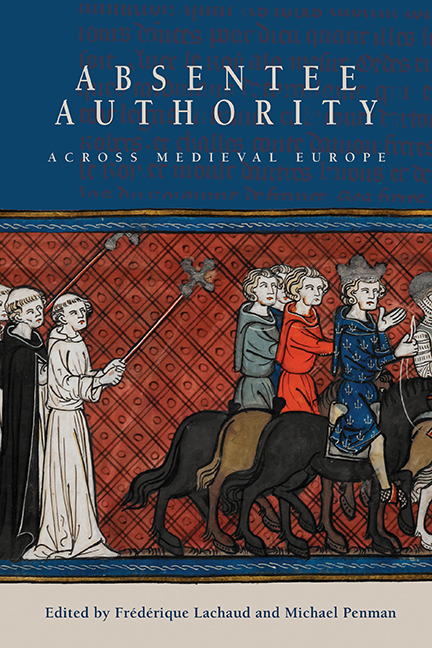Book contents
- Frontmatter
- Contents
- List of Illustrations
- List of Contributors
- Acknowledgements
- List of Abbreviations
- Introduction: Absentee Authority across Medieval Europe
- 1 Incarnating Authority, Exercising Authority: The Figure of the King in the Merovingian Era
- 2 ‘Ubi armae ibi princeps’: Medieval Emblematics as the Real Presence of the Prince
- 3 While the Bishop's Away …: Absentee Bishops of Parma during the Investiture Contest
- 4 An Inconceivable Absence: Usurpers and Illegitimate Rulers in the Genealogical Rolls of the Kings of England, from the Late Thirteenth to the Early Fifteenth Centuries
- 5 Local Loyalty and Absentee Authority in Thirteenth-Century Normandy: The Evidence of the Querimoniae Normannorum (1247)
- 6 Representation and Authority in Thirteenth-Century England and Gascony
- 7 Internal Exiles: Exclusion from the Fourteenth-Century English Court and Kingdom
- 8 ‘Si grant charté a Paris … par defaulté du roy’: Governmental Practice and the Customary Geography of the Absence and Presence of the King in France (1364–1525)
- 9 Was the Couple a Palliative to the Absence of the Prince? The Political Role and Influence of Margaret of Flanders during the Reign of Philip the Bold, Duke and Count of Burgundy (1384–1404)
- 10 Guardian – Lieutenant – Governor: Absentee Monarchy and Proxy Power in Scotland's Long Fourteenth Century
- 11 Absentee Authority in Late Medieval Iceland, as Viewed from the Literary Sources
- 12 Representatives of Kings and ‘Kings’ as Representatives: Authority and its Representation in Professional Groups in Late Medieval and Early Modern France – the Example of the King of Minstrels and of the King of Mercers
- Index
1 - Incarnating Authority, Exercising Authority: The Figure of the King in the Merovingian Era
Published online by Cambridge University Press: 16 May 2018
- Frontmatter
- Contents
- List of Illustrations
- List of Contributors
- Acknowledgements
- List of Abbreviations
- Introduction: Absentee Authority across Medieval Europe
- 1 Incarnating Authority, Exercising Authority: The Figure of the King in the Merovingian Era
- 2 ‘Ubi armae ibi princeps’: Medieval Emblematics as the Real Presence of the Prince
- 3 While the Bishop's Away …: Absentee Bishops of Parma during the Investiture Contest
- 4 An Inconceivable Absence: Usurpers and Illegitimate Rulers in the Genealogical Rolls of the Kings of England, from the Late Thirteenth to the Early Fifteenth Centuries
- 5 Local Loyalty and Absentee Authority in Thirteenth-Century Normandy: The Evidence of the Querimoniae Normannorum (1247)
- 6 Representation and Authority in Thirteenth-Century England and Gascony
- 7 Internal Exiles: Exclusion from the Fourteenth-Century English Court and Kingdom
- 8 ‘Si grant charté a Paris … par defaulté du roy’: Governmental Practice and the Customary Geography of the Absence and Presence of the King in France (1364–1525)
- 9 Was the Couple a Palliative to the Absence of the Prince? The Political Role and Influence of Margaret of Flanders during the Reign of Philip the Bold, Duke and Count of Burgundy (1384–1404)
- 10 Guardian – Lieutenant – Governor: Absentee Monarchy and Proxy Power in Scotland's Long Fourteenth Century
- 11 Absentee Authority in Late Medieval Iceland, as Viewed from the Literary Sources
- 12 Representatives of Kings and ‘Kings’ as Representatives: Authority and its Representation in Professional Groups in Late Medieval and Early Modern France – the Example of the King of Minstrels and of the King of Mercers
- Index
Summary
On the death of Theuderic IV in 737, the Mayor of the Palace, Charles Martel (c. 688–741), took the decision not to nominate a new king of France. The vacancy lasted six years: Pippin the Short and Carloman, the sons of Charles, eventually reinstated a Merovingian on the throne. For a long time, this interregnum has been analysed in terms of the rising power of the Pippinides – and probably quite rightly so. Yet it has also been seen as proof of the marked weakness of the monarchy. This is more doubtful: in reality, instead of interpreting this episode in the light of the Carolingian rise, one may replace it in the context of the political practices which had been in use since the beginnings of the Frankish settlement in Gaul.
The idea of an ancestral ‘Germanic kingship’ resting on a warlike sacredness and endowed with limited political attributes is probably best placed alongside the myths of historiography. In fact the Merovingian world had inherited most of its governing traditions from Rome. In the late imperial period, the auctoritas represented the plenitude of sovereign power, such as the issue of rights, the monopoly of gold coinage, the control of diplomacy and the control of religious cults. This authority was the preserve of the princeps, while judicial and military powers could be delegated to agents. If one is to give any credence to the rare royal edicts that have been preserved, this conception of kingly power did not undergo any significant transformation between the fifth and the early eighth centuries. The auctoritas was normally reserved to the sovereign only. One did not think of palatine and territorial offices in terms other than temporary and revocable delegations of power.
Thus in the early days of the Merovingian dynasty, the very notion of central authority had indeed raised problems of definition. Thanks to a foedus with the Empire in the fifth century, the Frankish kings had been given control of the provinces of northern Gaul. But at best this was delegated power. The real master of the world was still in Constantinople, a fact that the Merovingians were willing to accept. In their correspondence, they presented themselves as the ‘sons’ of the emperor. On the solidi minted by the Franks, the Byzantine emperor appeared as the sole issuing authority, and this situation lasted until the late sixth century.
- Type
- Chapter
- Information
- Absentee Authority across Medieval Europe , pp. 21 - 36Publisher: Boydell & BrewerPrint publication year: 2017



